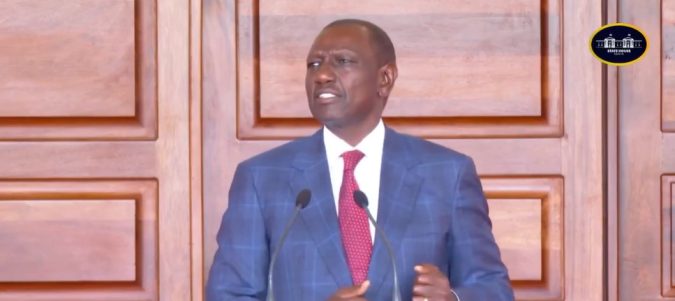President William Ruto has stated that the government has transitioned all public procurements to an electronic platform, a pledge he made during his State of the Nation address in November 2024.
Speaking during an Easter Sunday service in Ntulele, Narok County, on April 20, 2025, the head of state underscored that the adoption of e-procurement was not merely a policy preference but a deliberate step towards embedding transparency, eliminating ambiguity in public spending, and enforcing accountability in the stewardship of national resources.
“I concur with the sentiments expressed by fellow leaders—that the resources bestowed upon us as Kenyans must be utilised with utmost responsibility and integrity,” he said, addressing a crowd of residents and local officials.
“Public funds must be expended in a manner that is both open and traceable. It is for this reason that, in my address to the nation, I made two solemn commitments. Firstly, I announced that starting from April this year, all procurement processes undertaken by government entities would henceforth be conducted through an electronic platform—e-procurement—so as to ensure complete transparency in the acquisition of public goods and services.”
The president elaborated that this transition, while still unfolding, is designed to create a procurement environment where competitive pricing is not only encouraged but verifiably achieved, where the identity of every successful bidder is publicly known, and where the spectre of backdoor dealings is significantly diminished.
“I am pleased to say that, in line with the promise I made to Kenyans, the e-procurement system has now been initiated. It is our intention to secure optimal value for money, guarantee fairness in the awarding of tenders, and permanently close the loopholes that have historically enabled misappropriation and inefficiency,” he said.
Conflict of Interest Bill
But while the president exuded optimism about the progress made so far, he also acknowledged that technological reform alone cannot dismantle the entrenched networks of vested interest that have long undermined the integrity of public administration.

To that end, he reiterated his commitment to seeing through the passage of a Conflict of Interest Bill—legislation that he believes will strike at the heart of corruption within government.
“My second commitment was to confront and eliminate corruption—particularly the type that is driven by individuals who exploit their positions of authority to enrich themselves, their allies, and their kin. I assured Kenyans that we would enact a Conflict of Interest Law, one that explicitly prevents public servants from using their offices to pursue personal gain,” Ruto explained.
He disclosed that he had already forwarded the legislative proposal to Parliament and issued a stern reminder to lawmakers that should they fail to enact the law in its proposed form, he would do everything within his constitutional mandate to ensure it sees the light of day.
“I have engaged Members of Parliament and made it clear that if they do not pass legislation in accordance with our national promise—a law robust enough to dismantle the entrenched culture of self-interest and misuse of office—I will take it upon myself to drive the agenda forward. The bill has already been submitted, and Parliament has three weeks to consider and pass it. This law is not a theoretical exercise. It will apply to everyone, from the president to the member of the county assembly and every person in between. Accountability will no longer be optional.”
President Ruto concluded his remarks with a call for unity of purpose among lawmakers, urging both the National Assembly and the Senate to treat the bill with the seriousness it deserves, as its passage would not only redefine standards of integrity in public service but also restore public confidence in the machinery of state.
“This law will bind every public officer—myself included—because accountability must start at the top. We cannot ask Kenyans to trust the government if we ourselves are not prepared to lead with transparency,” he declared